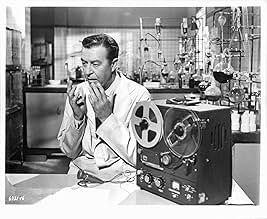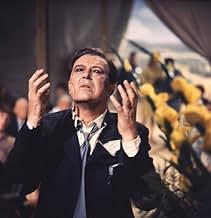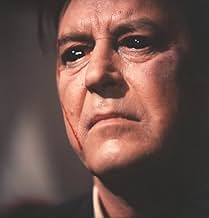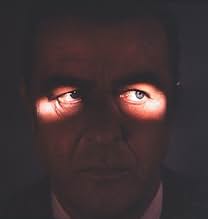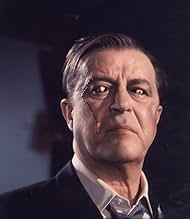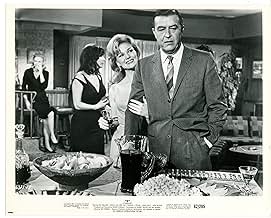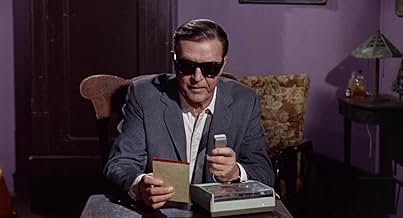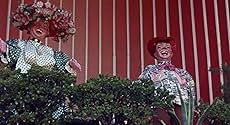NOTE IMDb
6,6/10
8,8 k
MA NOTE
Ajouter une intrigue dans votre langueAn ambitious scientist invents an eye drop formula that grants him X-ray vision, but his new powers have disastrous consequences.An ambitious scientist invents an eye drop formula that grants him X-ray vision, but his new powers have disastrous consequences.An ambitious scientist invents an eye drop formula that grants him X-ray vision, but his new powers have disastrous consequences.
- Réalisation
- Scénario
- Casting principal
- Récompenses
- 2 nominations au total
Diana Van der Vlis
- Dr. Diane Fairfax
- (as Diana van der Vlis)
Budd Albright
- Dance sequence
- (non crédité)
Leon Alton
- Casino Patron
- (non crédité)
Morris Ankrum
- Mr. Bowhead
- (non crédité)
Benjie Bancroft
- Dealer
- (non crédité)
George DeNormand
- Medical Board Member
- (non crédité)
John Dierkes
- Preacher
- (non crédité)
Bobby Gilbert
- Man Outside Office
- (non crédité)
Stuart Hall
- Casino Patron
- (non crédité)
Kathryn Hart
- Mrs. Mart
- (non crédité)
Ed Haskett
- Casino Patron
- (non crédité)
Jonathan Haze
- Heckler
- (non crédité)
Harvey Jacobson
- Casino Boss
- (non crédité)
Vicki Lee
- Young Girl Patient
- (non crédité)
Avis à la une
Dr Xavier (Ray Milland) thirst of knowledge experiments with a formula on his owns eyes which will allow to see through solid material. As he can read a closed book , making diagnosis ills , and seeing naked people. He can literally observe through things , watching beyond of visible lights and turning into a rarefied figure as mad doctor. Then the staff intends to cut off his funds for further research . But an accident takes place , dieing a medic (Harlod J Stone), as he flees and the newspapers publicize , as the Angeles Daily Sun : ¨Doctor falls to death¨, ¨Physician murdered¨ and the Angeles Chronicle : ¨Doctor killer flees¨. Later on , Xavier wearing dark glasses works at a sideshow (ruled by Don Rickles) as fortune teller and finally as psychic consultant. Such increased powers of perception and knowledge bring him neither happiness nor strengthening but transform him an outcast, unsettling person.
A stylish and first-rate film , confidently realized and plenty of eye-popping moments referred to the visions. The basic opposition between blindness and vision is a central key of this interesting work. Good performances from Ray Milland as doctor who gains power to see beyond, Harold J Stone as unfortunate medic who accidentally falls and Don Rickles as ambitious manager . Appears uncredited notorious secondary cast as Morris Ankrum, John Hoyt, and John Dierkes as preacher. Furthermore unbilled actors of the Corman factory as Dick Miller and Jonathan Haze. It packs not withstanding and weak special effects made by date means. Rare musical score by Lex Baxter and colorful cinematography by Floyd Crosby, booth of whom are habitual of Roger Corman.
After his period realizing poverty-budget horror movies as ¨Swamp woman, The beast with a million of eyes, Attack of the crab monsters , Undead¨, then came the cycle of tales of terror based on Poe as ¨ House of Usher, Pit and pendulum, The raven , Tales of terror, The masque of the red death ¨ , and Corman made this undisputed masterpiece , X , that won the Golden Asteroid in the Trieste Festival of Science Fiction Films in 1963. Rating : Above average, definitively wholesome watching , Corman's achievement to have bent the Sci-Fi genre with splendid results.
A stylish and first-rate film , confidently realized and plenty of eye-popping moments referred to the visions. The basic opposition between blindness and vision is a central key of this interesting work. Good performances from Ray Milland as doctor who gains power to see beyond, Harold J Stone as unfortunate medic who accidentally falls and Don Rickles as ambitious manager . Appears uncredited notorious secondary cast as Morris Ankrum, John Hoyt, and John Dierkes as preacher. Furthermore unbilled actors of the Corman factory as Dick Miller and Jonathan Haze. It packs not withstanding and weak special effects made by date means. Rare musical score by Lex Baxter and colorful cinematography by Floyd Crosby, booth of whom are habitual of Roger Corman.
After his period realizing poverty-budget horror movies as ¨Swamp woman, The beast with a million of eyes, Attack of the crab monsters , Undead¨, then came the cycle of tales of terror based on Poe as ¨ House of Usher, Pit and pendulum, The raven , Tales of terror, The masque of the red death ¨ , and Corman made this undisputed masterpiece , X , that won the Golden Asteroid in the Trieste Festival of Science Fiction Films in 1963. Rating : Above average, definitively wholesome watching , Corman's achievement to have bent the Sci-Fi genre with splendid results.
A very thoughtful, engrossing, flawed film from superhuman director/producer Roger Corman. Yep, it has some problems, most primarily dealing with a limited budget. But what it lacks in dollars it has in heart and its ability to make you think about what we are missing out seeing with our vision. I am not sure that much, or even any, scientific creedence can be given to the idea behind the experiments of Dr. Xavier James and his search to see beyond what normal vision allows. Ray Milland gives a fine performance as the obsessed man out to continue his experiments even if they involve using himself as the human guinea pig. Some of the scenes and dialogue are a bit hokey by today's standards but most fit the film very nicely. The scene with Milland at a party is a real hoot and great comedic relief. I also loved the end to the film but thought it could have been plucked out a little longer. The effects are very sparse and the only ones I really thought were any good were the ones used to highlight Milland's eyes through the film. The film boasts a fine cast of stalwart sci-fi/Corman people such as Morris Ankrum, Dick Miller, Jonathan Haze, and Barboura Morris, as well as a young(and obviously talented) Don Rickles. Definitely try to see your way to seeing this film.
This was the typically-hokey-but fun Roger Corman film but one that keeps your interest most the way and at least stars a famous classic-era actor: Ray Milland. One actually wonders what an actor of Milland's status would doing in a B Grade B-type sci-fi movie like this. For someone who had admired Milland's work for many years, it just seems odd for me to see him in a small-budget film. Maybe things got tough for him near the end of his career and he would take most any role. I don't know, and I'm not judging.....just curious why he took this role. I do know having him in the movie elevates it and the dialog isn't as cheesy as one would expect in a 1950-ish sci-fi horror story made in the '60s.
Comedian Don Rickles playing a greedy criminal guy was another odd cast selection, but, he, too, was fun to watch.
Corman was smart to keep this at a respectable 79 minutes. Had it gone on longer, it would have started to drag. It would be interesting to see this film done with today's special-effects.
Comedian Don Rickles playing a greedy criminal guy was another odd cast selection, but, he, too, was fun to watch.
Corman was smart to keep this at a respectable 79 minutes. Had it gone on longer, it would have started to drag. It would be interesting to see this film done with today's special-effects.
To this writer, the film is Roger Corman's best entry into sci-fi. Many of his 50s efforts hold a certain campy charm, with their low-budget effects - and this film is similar in that regard. It does not dwell on the effects, in fact some of them are rather poor. What it does have in its favor is a tight screenplay that gets into the story quickly, as will the viewer - and it's engrossing enough and the characters interesting enough that one stays involved through the episodic story.
What it has most in its favor is an excellent performance from Ray Milland, then in his last days being top-billed, and he milks it for all that it's worth. In some scenes Corman goes for a direct close-up and Milland's facial reactions indicate that he took the the role in a small-budget/tight schedule film with all the enthusiasm that he did in one of his roles for Alfred Hitchcock ("Dial M For Murder") or Fritz Lang ("Ministry of Fear"). Smooth, refined, but a man of immediate action if necessary, Milland's Dr. Xavier is not your usual mad scientist. As with Claude Rains in "The Invisible Man" or Al Hedison in "The Fly" he's the scientist who made the mistake of being his own subject.
Occasionally Corman goes for the cheap gag (the party sequence, where Xavier examines the guests sans attire - but inoffensive in a typical 60s approach), but the carnival scenes and the basement healer scenes show a maturity to Corman's direction, and these scenes are greatly helped by the performance of Don Rickles. He's as sleazy as one can get and admits that if he had the power, he would use it to see "all the undressed women my poor eyes can stand" and you believe it. A scene where Milland confronts other carnival workers who are speculating on his "power" shows the doctor to be both introspective and world weary at the same time. At this point even he does not know what to do with his ability, but Rickles' suggestion of setting up a site to "heal" others leads to the film's most revealing and almost poetic sequence. Xavier's original intention was to help the ill, but his implication in an accidental murder led him to seek refuge in the carnival Richard Kimble-style.
Diana Van Der Vlis does well with her underwritten role in which at one point she's rather quickly dropped, and then resurfaces rather conveniently later in the story - to no great effect. This was only her second feature film, though she had done a number of TV guest shots. Although half Milland's age, she seems more mature than her 28 years and they make a believable pair. A bonus is the appearance of a number of veterans in brief roles - John Hoyt, Harold J. Stone, John Dierkes and Morris Ankrum, as well as Corman stalwart Dick Miller. Miller shares his scenes with Jonathan Haze, whom it appears was getting the cheapest rate Corman could pay as he has no lines at all. He was rather bitter about this as he revealed in an interview years later.
Floyd Crosby's cinematography belies the small budget - only $300,000 and a shooting schedule of about three weeks. According to Corman they did rehearse a bit more than usual - and in the finished product it shows. He claims he even went as high as four takes, which may not exactly put him in William Wyler or Stanley Kubrick territory, but it's a far cry from what he'd do in the 50s. Les Baxter contributes what may be my favorite of his scores, fully complimentary to the action on screen without overwhelming it.
There's a bit of controversy over the ending - some attribute an extra line of dialog that never appeared in any print that I've seen, but it is still one of the most surprising endings of any sci-fi film since "The Incredible Shrinking Man." That it won the top prize at the Trieste Science Fiction Film Festival would be enough for one to be curious enough to see it even this many years later - that it has held up so well over 40 years points to that award's validity.
What it has most in its favor is an excellent performance from Ray Milland, then in his last days being top-billed, and he milks it for all that it's worth. In some scenes Corman goes for a direct close-up and Milland's facial reactions indicate that he took the the role in a small-budget/tight schedule film with all the enthusiasm that he did in one of his roles for Alfred Hitchcock ("Dial M For Murder") or Fritz Lang ("Ministry of Fear"). Smooth, refined, but a man of immediate action if necessary, Milland's Dr. Xavier is not your usual mad scientist. As with Claude Rains in "The Invisible Man" or Al Hedison in "The Fly" he's the scientist who made the mistake of being his own subject.
Occasionally Corman goes for the cheap gag (the party sequence, where Xavier examines the guests sans attire - but inoffensive in a typical 60s approach), but the carnival scenes and the basement healer scenes show a maturity to Corman's direction, and these scenes are greatly helped by the performance of Don Rickles. He's as sleazy as one can get and admits that if he had the power, he would use it to see "all the undressed women my poor eyes can stand" and you believe it. A scene where Milland confronts other carnival workers who are speculating on his "power" shows the doctor to be both introspective and world weary at the same time. At this point even he does not know what to do with his ability, but Rickles' suggestion of setting up a site to "heal" others leads to the film's most revealing and almost poetic sequence. Xavier's original intention was to help the ill, but his implication in an accidental murder led him to seek refuge in the carnival Richard Kimble-style.
Diana Van Der Vlis does well with her underwritten role in which at one point she's rather quickly dropped, and then resurfaces rather conveniently later in the story - to no great effect. This was only her second feature film, though she had done a number of TV guest shots. Although half Milland's age, she seems more mature than her 28 years and they make a believable pair. A bonus is the appearance of a number of veterans in brief roles - John Hoyt, Harold J. Stone, John Dierkes and Morris Ankrum, as well as Corman stalwart Dick Miller. Miller shares his scenes with Jonathan Haze, whom it appears was getting the cheapest rate Corman could pay as he has no lines at all. He was rather bitter about this as he revealed in an interview years later.
Floyd Crosby's cinematography belies the small budget - only $300,000 and a shooting schedule of about three weeks. According to Corman they did rehearse a bit more than usual - and in the finished product it shows. He claims he even went as high as four takes, which may not exactly put him in William Wyler or Stanley Kubrick territory, but it's a far cry from what he'd do in the 50s. Les Baxter contributes what may be my favorite of his scores, fully complimentary to the action on screen without overwhelming it.
There's a bit of controversy over the ending - some attribute an extra line of dialog that never appeared in any print that I've seen, but it is still one of the most surprising endings of any sci-fi film since "The Incredible Shrinking Man." That it won the top prize at the Trieste Science Fiction Film Festival would be enough for one to be curious enough to see it even this many years later - that it has held up so well over 40 years points to that award's validity.
RELEASED IN 1963 and directed by Roger Corman, "X: The Man with the X-Ray Eyes" chronicles events in Los Angeles when a doctor (Ray Milland) develops a formula that grants x-ray vision, which derails his career and forces him to join a carnival, using his new power to make a living. Diana Van der Vlis plays his disciple while Don Rickles is on hand as a carnival barker.
The early 60's vibe is to die for, but the beginning is rather dull. Things perk up at an adult party where the aging doctor tries to keep hip and eventually sees everyone nakkid (lol). The carnival sequence and what it leads into are arguably the best parts, although the Vegas and tent revival episodes have their attractions. The movie scores meh on the female front, but Lorrie Summers and Cathie Merchant have small parts.
THE MOVIE RUNS 1 hour 19 minutes and was shot in Los Angeles, California & Las Vegas, Nevada. WRITERS: Robert Dillon and Ray Russell. ADDITIONAL CAST: Harold J. Stone and John Hoyt play colleagues of the doctor.
GRADE: B-
The early 60's vibe is to die for, but the beginning is rather dull. Things perk up at an adult party where the aging doctor tries to keep hip and eventually sees everyone nakkid (lol). The carnival sequence and what it leads into are arguably the best parts, although the Vegas and tent revival episodes have their attractions. The movie scores meh on the female front, but Lorrie Summers and Cathie Merchant have small parts.
THE MOVIE RUNS 1 hour 19 minutes and was shot in Los Angeles, California & Las Vegas, Nevada. WRITERS: Robert Dillon and Ray Russell. ADDITIONAL CAST: Harold J. Stone and John Hoyt play colleagues of the doctor.
GRADE: B-
Le saviez-vous
- AnecdotesTo create the effect of being able to see through a building, the director filmed the building while it was under construction.
- GaffesThe first X-ray that Dr. Xavier quizzes Dr. Fairfax with is a normal chest X-ray. There is no bullet on that film. Bullets show up very well on X-rays.
- Citations
Dr. Diane Fairfax: What do you see?
Dr. James Xavier: The city... as if it were unborn. Rising into the sky with fingers of metal, limbs without flesh, girders without stone. Signs hanging without support. Wires dipping and swaying without poles. A city unborn. Flesh dissolved in an acid of light. A city of the dead.
- Versions alternativesThrough an apparent lab error, some of the 16mm U.S. television syndication prints had the ending credits in Spanish.
- ConnexionsEdited into Gli ultimi giorni dell'umanità (2022)
Meilleurs choix
Connectez-vous pour évaluer et suivre la liste de favoris afin de recevoir des recommandations personnalisées
- How long is X: The Man with the X-Ray Eyes?Alimenté par Alexa
Détails
- Date de sortie
- Pays d’origine
- Langue
- Aussi connu sous le nom de
- L'homme aux rayons X
- Lieux de tournage
- Queen of Angels Hospital - 2301 Bellevue Avenue, Los Angeles, Californie, États-Unis(Establishing shot of hospital.)
- Société de production
- Voir plus de crédits d'entreprise sur IMDbPro
Box-office
- Budget
- 250 000 $US (estimé)
- Durée1 heure 19 minutes
- Mixage
- Rapport de forme
- 1.85 : 1
Contribuer à cette page
Suggérer une modification ou ajouter du contenu manquant

Lacune principale
By what name was L'horrible cas du docteur X (1963) officially released in India in English?
Répondre

